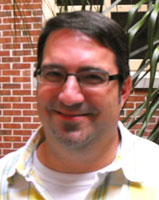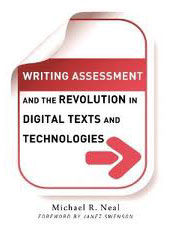 Digital technologies and new media literacy are opening up creative ways for writers at all levels to compose and distribute their work. When classroom assignments result in digital projects that combine writing, visuals, and audio texts, educators might struggle with how to assess these new texts fairly and accurately.
Digital technologies and new media literacy are opening up creative ways for writers at all levels to compose and distribute their work. When classroom assignments result in digital projects that combine writing, visuals, and audio texts, educators might struggle with how to assess these new texts fairly and accurately.
In his new book, Writing Assessment and the Revolution in Digital Texts and Technologies (Teachers College Press, 2010), Michael Neal addresses these issues and offers tools to help educators navigate an evolving educational landscape. As the publisher writes, Neal "provides an innovative framework for the formative and holistic assessment of students' digital composition at the college and high school level."
In the introduction, Neal writes that his goal with Writing Assessment is to "illuminate several points of intersection between writing assessment and technology to show how the cultural expectations of technologies shape our expectations of writing assessment." He notes that there is "a distinction between writing assessments as technology and writing assessments with technology." Because of outside influences and decisions based on habit, "educators have become (often unintentionally or against our better judgment) proponents of writing assessments that often are reductive and at odds with our best understanding of teaching and learning."
Although digital technologies are ever-changing, they are still relatively new, which offers an opportunity to "reframe our approaches to writing assessment so that they promote a rich and robust understanding of language and literacy," Neal writes. "As is often the case when promoting a radical shift—a revolution of sorts—we have real obstacles."
 Tackling the issues is valuable, Neal writes, because "understanding writing assessment as and with technology provides a framework that can help us promote a transformation that can lead us and our students into practices that reflect and respond to the ways technologies and texts are evolving in the digital age." On this his first book, Neal comments that his research into assessments as technologies was particularly informative: "The more I investigated historical receptions to a variety of technologies, the clearer the patterns became and the more I understood that the current dilemmas in assessment we face today—such as machine scored writing—are engrained within powerful social narratives. Too often we see today's problems as disconnected from their histories and contexts."
Tackling the issues is valuable, Neal writes, because "understanding writing assessment as and with technology provides a framework that can help us promote a transformation that can lead us and our students into practices that reflect and respond to the ways technologies and texts are evolving in the digital age." On this his first book, Neal comments that his research into assessments as technologies was particularly informative: "The more I investigated historical receptions to a variety of technologies, the clearer the patterns became and the more I understood that the current dilemmas in assessment we face today—such as machine scored writing—are engrained within powerful social narratives. Too often we see today's problems as disconnected from their histories and contexts."
Bob Broad, professor of English at Illinois State University and a colleague of Neal's in the field of writing assessment, commends Neal for "grounding his inquiry in stories and humor" and writes that Writing Assessment is "a lucid exploration of how technologies and assessments illuminate and shape each other." He praises Neal for blending "a robust command of relevant theories with a deep reverence for the nuanced complexities of actual students and teachers working in specific learning contexts."
Neal acknowledges in his book that he is "neither antitechnology nor protechnology… I do not consider technologies the problem or the solution, and if we approach them either way, we reinforce an unhealthy divide." In fact, technologies "will continue to emerge, reshape, and revolutionize the ways we think about writing and its assessment in the 21st century and beyond," Neal writes. "Since digital technologies are becoming more ubiquitous within educational contexts, we as educators, especially those of us who are invested in writing and its delivery to students, must find ways to determine which technologies are worth pursuing and which we should resist."
Neal's current research focuses on expanding his work in Writing Assessment by tracking ways students understand and respond to the changing nature of writing in the digital age. Students now must navigate new rhetorical constraints—including modes of communication, available media, and writing platforms—to compose and deliver their content. Neal points out that we are a long way from the assumption that all college writing projects are necessarily paper-based, traditional research papers. However, even though changes in writing are inevitable, Neal intends to study what this evolution in literacy will mean inside and outside of educational settings.
